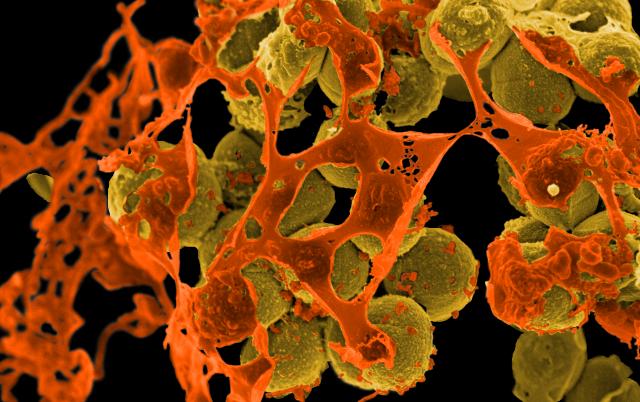Carbapenem-resistant Enterobacteriaceae (CRE)
See the following -
'Nightmare Bacteria' Spread In Southeast
Superbugs known as CRE — called "nightmare bacteria" by federal health officials because they are deadly and virtually untreatable — are skyrocketing in the Southeastern USA, new research shows...
- Login to post comments
A Deadly Superbug Appears to Be Invading America's Hospitals
A dangerous type of superbug has more tricks up its sleeves than we may be giving it credit for, a recent study suggests. The researchers found that this class of bacteria, CREs — that's short for carbapenem-resistant Enterobacteriaceae — has more ways to evade antibiotics than have been currently identified, and that these bugs share their tricks readily across the families of bacteria that make up this grouping...
- Login to post comments
A Nevada Woman Dies of a Superbug Resistant to Every Available Antibiotic in the US
If it sometimes seems like the idea of antibiotic resistance, though unsettling, is more theoretical than real, please read on. Public health officials from Nevada are reporting on a case of a woman who died in Reno in September from an incurable infection. Testing showed the superbug that had spread throughout her system could fend off 26 different antibiotics. “It was tested against everything that’s available in the United States … and was not effective,” said Dr. Alexander Kallen, a medical officer in the Centers for Disease Control and Prevention’s division of health care quality promotion...
- Login to post comments
Antibiotic Resistance Doesn't Just Make Bacteria Harder To Kill – It Can Actually Make Them Stronger
 Bacteria can become drug-resistant in two ways – resistance can be natural, meaning that the genes conferring resistance are already present in the bacterial chromosome, or they can be acquired through mutation or by picking up antibiotic-resistance genes from other microbes. It is now possible to use new DNA-sequencing technologies to take a closer look at how the antibiotic resistance can make some bacteria weaker or stronger. And in a new study, we found that – contrary to conventional wisdom around antibiotics – resistance can actually make some bacteria fitter and even more virulent.
Bacteria can become drug-resistant in two ways – resistance can be natural, meaning that the genes conferring resistance are already present in the bacterial chromosome, or they can be acquired through mutation or by picking up antibiotic-resistance genes from other microbes. It is now possible to use new DNA-sequencing technologies to take a closer look at how the antibiotic resistance can make some bacteria weaker or stronger. And in a new study, we found that – contrary to conventional wisdom around antibiotics – resistance can actually make some bacteria fitter and even more virulent.
- Login to post comments
CDC Calls Out Antibiotic Prescribing Problems
In a major report today that looked at antibiotic usage, the US Centers for Disease Control and Prevention (CDC) said some clinicians in similar hospital units prescribe triple the amounts, with some making the types of errors that fuel drug-resistance problems that put many more patients at risk. Read More »
- Login to post comments
Decoding Superbug Evolution
The spread of antibiotic-resistance pathogens and hospital-related infections have become a serious threat. According to the Centers for Disease Control and Prevention, on any given day, about one in 25 hospital patients has at least one such infection, and as many as one in nine die as a result, reports ScienceDaily...
- Login to post comments
Deconstructing the CDC’s ‘Snapshot’ Estimates
In 2013, the U.S. Centers for Disease Control and Prevention released estimates of how many people in the country die every year from antibiotic resistant infections: 23,000. The agency estimates that an additional 15,000 die annually from Clostridium difficile, an infection linked to long-term antibiotic use. The estimates, the agency said at the time, provided the “first snapshot of the burden and threats posed by antibiotic-resistant germs having the most impact on human health”...
- Login to post comments
Drug-resistant Superbugs Could Become Deadlier than Cancer
Superbugs are on track to kill 10 million people a year by 2050--more than those who die from cancer, warned UK Chancellor George Osborne, who urged for global and radical action to fight the threat from bacteria that have become resistant to antibiotics. These drug-resistant bugs are "an even greater threat to mankind than cancer," said Osborne, who was in the District of Columbia late last week during a meeting of the International Monetary Fund, The Guardian reported...
- Login to post comments
How Superbugs Threaten Your Food And Life
...This worrying problem causing as much global concern as terrorism is antibiotic resistance. Antibiotics, the wonder drugs that made surgery safe and stopped disease outbreaks by preventing and curing all infections four decades ago, can no longer do so...
- Login to post comments
L.A. County Patient Was Infected with Drug-Resistant E. coli
Scientists were alarmed last year when they found that a woman in Pennsylvania had been infected with bacteria that was resistant to colistin, an antibiotic that is considered the last line of defense against particularly nasty illnesses. It was a scary reminder that bacteria are increasingly able to survive antibiotics, making some infections extremely difficult or even impossible to treat. Now California is on a list of six states where patients have been infected with bacteria that contains a gene known as mcr-1, which makes it resistant to colistin...
- Login to post comments
No One Knows How Many Patients Are Dying from Superbug Infections in California Hospitals
Many thousands of Californians are dying every year from infections they caught while in hospitals. But you’d never know that from their death certificates. Sharley McMullen of Manhattan Beach came down with a fever just hours after being wheeled out of a Torrance Memorial Medical Center operating room on May 4, 2014. A missionary’s daughter who worked as a secretary at Cape Canaveral, Fla., at the height of the space race, McMullen, 72, was there for treatment of a bleeding stomach ulcer. Soon, though, she was fighting for her life...
- Login to post comments
The Time to Stop Giving Antibiotics to Cows, Pigs, and Chickens Is Now
 Antibiotic resistance has been blamed for at least 2 million illnesses and 23,000 deaths in the US. Researchers are especially concerned about the widespread use of antibiotics in raising cattle, pigs, and other animals for food production. The drugs help the animals bulk up, which boosts their value, but experts warn that they can also promote antibiotic resistance. I’ve asked two guest authors, Josh Bloom and Dr. David Shlaes of the American Council on Science and Health, to share their insights on this issue. They warn that more needs to be done to curb the use of antibiotics in food-producing animals.
Antibiotic resistance has been blamed for at least 2 million illnesses and 23,000 deaths in the US. Researchers are especially concerned about the widespread use of antibiotics in raising cattle, pigs, and other animals for food production. The drugs help the animals bulk up, which boosts their value, but experts warn that they can also promote antibiotic resistance. I’ve asked two guest authors, Josh Bloom and Dr. David Shlaes of the American Council on Science and Health, to share their insights on this issue. They warn that more needs to be done to curb the use of antibiotics in food-producing animals.
- Login to post comments
Traveling Abroad? Careful What You Carry Back… In Your Guts
If you do any kind of challenging travel — adventure travel, backpacking, even just going to less-developed parts of the world — you’ve probably evolved some sort of protective routine. [...] But a new study just published in EuroSurveillance, the peer-reviewed journal of Europe’s equivalent of the CDC, raises the possibility that even if you are doing the right thing, you could pick up some very nasty stuff while you’re abroad [...]. Read More »
- Login to post comments
‘Superbug’ Scourge Spreads as U.S. Fails to Track Rising Human Toll
Fifteen years after the U.S. declared drug-resistant infections to be a grave threat, the crisis is only worsening, a Reuters investigation finds, as government agencies remain unwilling or unable to impose reporting requirements on a healthcare industry that often hides the problem...
- Login to post comments